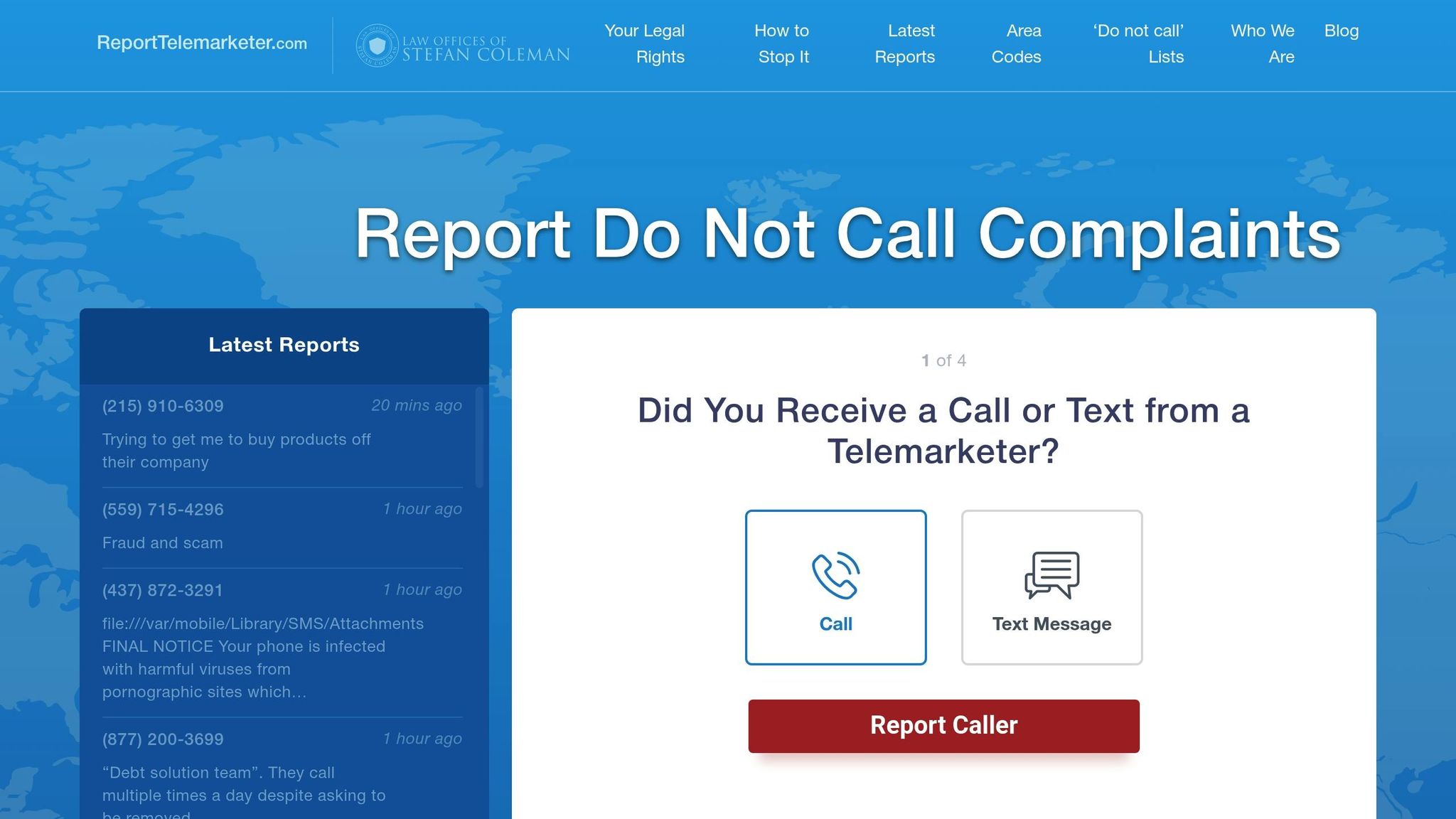
Georgia has implemented stricter telemarketing laws to protect consumers and hold businesses more accountable. These changes, effective July 2024, introduce new compliance rules, expanded consumer rights, and tougher penalties for violations.
Key Updates:
- No "knowing" requirement for violations: Businesses can be liable even if unaware of violations.
- Higher damages: Removal of the cap allows unlimited compensation.
- Class action lawsuits: Consumers can now file collective legal actions.
- Vicarious liability: Companies are responsible for vendor actions.
- Stricter call limits: Automated healthcare calls restricted to 1 per day and 3 per month.
For Consumers:
- Legal options: File individual claims or join class-action lawsuits.
- Damages: Up to $1,000 per violation, plus attorney fees.
- Evidence: Keep call logs, opt-out records, and proof of DNC registration.
For Businesses:
- Stronger oversight: Monitor vendors and maintain detailed records.
- Compliance requirements: Document consent, call logs, and vendor contracts.
- Proactive measures: Train employees, audit vendors, and use automated systems.
These updates align Georgia with stricter federal telemarketing laws, making compliance essential for businesses while empowering consumers to take action against violations.
Major Law Changes in 2024
Georgia’s telemarketing laws are undergoing notable updates in 2024, focusing on three main areas:
Business Responsibility Rules
Under the new rules, businesses must enforce strict oversight of their vendors. Companies are now required to set up detailed monitoring systems, as claiming ignorance of violations is no longer a valid defense. The law does allow one exception: if calls were made to numbers mistakenly provided by another subscriber, businesses can avoid liability – but only if they had no knowledge of the error.
New Consumer Rights
The changes also strengthen protections for consumers, giving them more legal options and holding violators more accountable. Key updates include:
- The ability to recover reasonable attorney fees in successful cases
- Broader liability for parties benefiting from violations
Required Documentation
To stay compliant, businesses must keep thorough records, including:
- Clear consent documentation
- Detailed call logs
- Written compliance policies
- Vendor contracts outlining regulatory obligations
These recordkeeping requirements tie directly into the updated vendor management expectations.
Legal Options for Consumers
Georgia’s updated laws now give consumers more power to take legal action against telemarketers. By removing the "knowing" requirement, the process of holding telemarketers accountable has become much simpler.
Filing Legal Claims
Georgia residents dealing with unwanted telemarketing calls have two main legal options:
Individual Claims
Consumers can file individual claims and seek damages of up to $1,000 for each violation. Some helpful updates include:
- The ability to recover attorney fees
- Liability extending to both the callers and the parties benefiting from the calls
Class Action Lawsuits
For broader violations, consumers can participate in or initiate class-action lawsuits. To strengthen their case, individuals should gather key evidence, such as:
- Call logs with dates
- Caller ID details or recordings
- Written records of opt-out requests
- Proof of registration on the Do Not Call (DNC) Registry
This type of documentation aligns with the recordkeeping obligations businesses must follow, ensuring accountability on both sides.
Using ReportTelemarketer.com

ReportTelemarketer.com simplifies the process of addressing unwanted calls. Thanks to Georgia’s provision for recovering attorney fees, consumers can enforce their rights without upfront costs. The platform offers:
- Help with filing regulatory complaints
- Legal assistance at no cost to the consumer
For additional support, the Georgia Governor’s Office of Consumer Affairs (1-800-805-7544) is available to assist with telemarketing violations.
sbb-itb-a8d93e1
Business Requirements
Businesses are now required to adopt multiple layers of defense to safeguard both consumer interests and their own operations under Georgia’s updated regulations. These measures build on the vendor management expectations outlined in Georgia’s Business Responsibility Rules.
Third-Party Management
With the introduction of vicarious liability risks in 2024, businesses need to establish strong oversight procedures for third-party vendors:
Vendor Due Diligence
- Conduct background checks to verify vendor licensing and compliance history.
Contractual Agreements
Clear contracts must outline the following:
- Compliance obligations as per Georgia law.
- Regular audit and reporting processes.
- Immediate steps for addressing any violations.
Preventing Violations
To stay aligned with the revised law, businesses should adopt proactive measures:
| Compliance Area | Required Actions |
|---|---|
| Training | Provide compliance training for employees and vendors. |
| Monitoring | Use call recording systems to ensure adherence. |
| List Management | Keep contact databases up to date. |
Technology Use
Employ automated systems for compliance, including call recording and secure data management.
Error Prevention Steps
To address potential errors in contacting numbers provided incorrectly, businesses must:
- Verify contact information through reliable processes.
- Keep documentation of consumer contact data sources.
- Maintain detailed records of consent and communication history.
Summary
Georgia’s telemarketing reforms under SB 73, effective July 2024, bring major updates that align with the article’s focus on stronger legal remedies:
Key Changes
The legislation introduces three critical updates:
- Strict liability: Businesses can now be held accountable even if they were unaware of violations.
- No cap on damages: Consumers can pursue unlimited damages and join class action lawsuits.
- Vendor requirements: Companies must conduct audits and maintain detailed documentation.
These reforms expand consumer legal options while requiring businesses to adopt more rigorous compliance measures. The stricter vendor oversight rules, coupled with the removal of damage caps and the "knowing" violation criteria, make this the toughest telemarketing enforcement framework Georgia has ever implemented.
The result? Businesses must step up their compliance efforts, while consumers benefit from easier ways to seek justice, including tools like ReportTelemarketer.com and the ability to join class actions.
FAQs
What is the telemarketer law in Georgia?
Starting in July 2024, Georgia’s telemarketing law enforces stricter rules for telemarketers. Key updates include:
- Calls to numbers on the Do Not Call Registry are strictly prohibited.
- Violations no longer require proof of "knowing" intent.
- Private lawsuits can now seek unlimited damages and qualify for class action status.
- Companies are held legally responsible for actions taken by third parties on their behalf.
These updates expand on Georgia’s existing Do Not Call protections, previously covered in the Major Law Changes section.
What is the mini TCPA law in Georgia?
Georgia’s mini-TCPA law strengthens consumer protections against unwanted telemarketing. Highlights include:
- No cap on damages awarded for successful claims.
- Consumers can pursue class action lawsuits.
- Defendants can no longer argue lack of knowledge to avoid liability.
What is the new law for telemarketers in Georgia?
The 2024 updates impose stricter requirements on telemarketers, such as:
- Gaining prior express consent before using automated dialing systems or artificial voices.
- Allowing consumers to revoke consent through any clear method.
- Limiting automated calls to residential numbers to three per month.
These rules align with the documentation standards described in the Required Documentation section. Consumers can report violations through platforms like ReportTelemarketer.com, as mentioned in the Legal Options section.